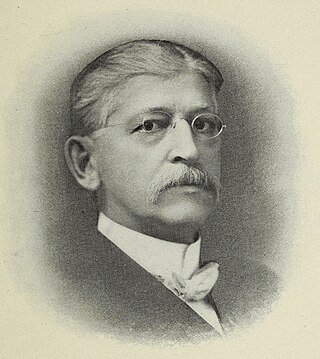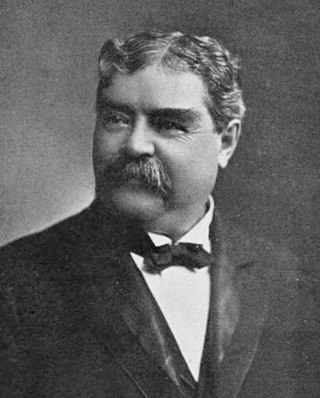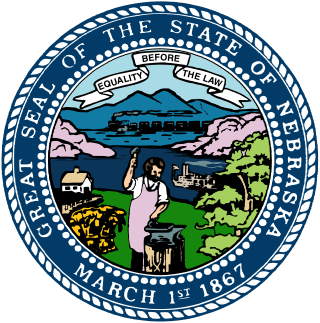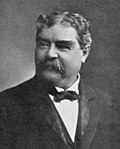
Presidential elections were held in the United States on November 8, 1904. Incumbent Republican president Theodore Roosevelt defeated the conservative Democratic nominee, Alton B. Parker. Roosevelt's victory made him the first president who ascended to the presidency upon the death of his predecessor to win a full term in his own right. This was also the second presidential election in which both major party candidates were registered in the same home state; the others have been in 1860, 1920, 1940, 1944, and 2016.

Aaron Thomas Bliss was an American politician who served as a U.S. Representative and the 25th governor of Michigan, and was from Saginaw. Bliss Township was named after him.

The 1964 United States Senate elections were held on November 3. The 33 seats of Class 1 were contested in regular elections. Special elections were also held to fill vacancies. They coincided with the election of President Lyndon B. Johnson by an overwhelming majority, to a full term. His Democratic Party picked up a net two seats from the Republicans. As of 2023, this was the last time either party has had a two-thirds majority in the Senate, which allowed the Senate Democrats to override a veto, propose constitutional amendments, or convict and expel certain officials without any votes from Senate Republicans. However, internal divisions would have prevented the Democrats from having done so. The Senate election cycle coincided with Democratic gains in the House in the same year.

The 1946 United States Senate elections were held November 5, 1946, in the middle of Democratic President Harry S. Truman's first term after Roosevelt's passing. The 32 seats of Class 1 were contested in regular elections, and four special elections were held to fill vacancies. The Republicans took control of the Senate by picking up twelve seats, mostly from the Democrats. This was the first time since 1932 that the Republicans had held the Senate, recovering from a low of 16 seats following the 1936 Senate elections.

The 1914 United States Senate elections were held on November 3, 1914. These were the first regularly scheduled elections held following the ratification of the Seventeenth Amendment to the United States Constitution in 1913, which required that all seats up for election be popularly elected, rather than chosen by their state legislatures. Thus, it was the first time that elections were generally scheduled on Election Day to coincide with the U.S. House elections. The 32 seats of Class 3 were contested in regular elections in 1914. Special elections were also held to fill vacancies. These elections occurred in the middle of Democratic President Woodrow Wilson's first term.

William Cotter Maybury was an American politician from the U.S. state of Michigan.

The 1906 New York state election was held on November 6, 1906, to elect the governor, the lieutenant governor, the Secretary of State, the state comptroller, the attorney general, the state treasurer and the state engineer, as well as all members of the New York State Assembly and the New York State Senate.

The 1900 New York state election was held on November 6, 1900, to elect the governor, the lieutenant governor, the Secretary of State, the state comptroller, the attorney general, the state treasurer and the state engineer, as well as all members of the New York State Assembly and the New York State Senate.

The United States Senate election of 1930 in Massachusetts was held on November 4, 1930. Incumbent Republican Senator Frederick H. Gillett did not run for re-election. In the open race to succeed him, Democratic Mayor of Fitchburg Marcus A. Coolidge defeated former U.S. Senator William M. Butler.

The 1926 United States Senate election in Illinois took place on November 2, 1926.

The United States Senate election of 1922 in New Jersey was held on November 7, 1922.
A Massachusetts general election was held on November 4, 1958, in the Commonwealth of Massachusetts.
A Massachusetts general election was held on November 4, 1952 in the Commonwealth of Massachusetts. Primary elections took place on September 16.

The 1922 United States Senate election in New York was held on November 7, 1922. Incumbent Republican Senator William Calder ran for re-election to a second term, but was defeated by Democrat Royal Copeland.

The 1902 Michigan gubernatorial election was held on November 4, 1902. Incumbent Republican Aaron T. Bliss defeated Democratic candidate Lorenzo T. Durand with 52.52% of the vote.

The 1914 Michigan gubernatorial election was held on November 3, 1914. Incumbent Democrat Woodbridge N. Ferris defeated Republican candidate Chase S. Osborn with 48.15% of the vote.

The 1932 Wisconsin gubernatorial election was held on November 8, 1932. Incumbent Republican Governor Philip La Follette was defeated in the Republican primary, and in the midst of the Great Depression and nationwide voter dissatisfaction with the Republican Party, Democratic nominee Albert G. Schmedeman defeated Republican nominee Walter J. Kohler Sr. and Socialist nominee Frank Metcalfe with 52.48% of the vote. Schmedeman became the first Democrat to win a gubernatorial election in Wisconsin since George Wilbur Peck in 1892. Two years later, in 1934, La Follette would run for governor again and defeated Schmedeman, this time running with the Progressive Party.

The 1916 Illinois lieutenant gubernatorial election was held on November 7, 1916. It saw the election of Republican former governor John G. Oglesby to a second nonconsecutive term.

The 1902 Nebraska gubernatorial election was held on November 4, 1902. Republican nominee John H. Mickey defeated Democratic and Populist fusion nominee William Henry Thompson with 49.69% of the vote.

The 1900 Nebraska gubernatorial election was held on November 6, 1900.





















